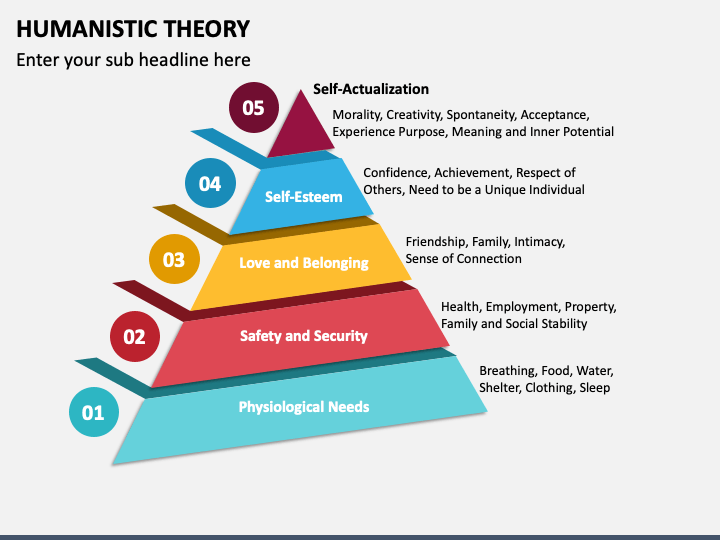The Humanistic Perspective: Unlocking Human Potential

The humanistic perspective in psychology emerged as a response to the limitations of psychoanalysis and behaviourism, advocating a more optimistic view of human nature. Pioneered by Carl Rogers and Abraham Maslow, this approach emphasises individual free will, personal growth, self-actualisation, and the innate potential for good in all people. It shifts the focus from unconscious drives or external conditioning to human strengths, aspirations, and the ability to shape one’s destiny.
Origins and Core Principles
The humanistic perspective was developed in the mid-20th century as an alternative to Freud’s focus on unconscious conflicts and Skinner’s emphasis on external reinforcement. It introduced a holistic view of psychology, considering emotions, creativity, personal meaning, and self-directed change.
Key principles of the humanistic perspective include:
- Free Will & Self-Determination – Humans are not solely driven by unconscious forces or conditioned responses; they have the ability to make choices and shape their future.
- Self-Actualisation – Maslow’s concept is that individuals strive to reach their full potential and become the best versions of themselves.
- Unconditional Positive Regard – Rogers’ belief that people grow best in environments where they are accepted and valued without judgment.
- Holistic Development – Emphasising emotional, intellectual, and personal growth rather than just psychological symptoms or disorders.
Maslow’s Hierarchy of Needs
A defining model within humanistic psychology is Maslow’s Hierarchy of Needs, which explains human motivation in a structured way:
- Physiological Needs – Food, water, shelter, and basic survival necessities.
- Safety Needs – Security, financial stability, and physical well-being.
- Love and Belonging – Relationships, connection, and a sense of community.
- Esteem Needs – Recognition, self-respect, and accomplishment.
- Self-Actualisation – The highest level, where individuals pursue personal growth and fulfilment.
Maslow argued that self-actualisation occurs when all other needs are met, allowing a person to embrace creativity, purpose, and meaningful contributions to society.
Carl Rogers and the Concept of Self
Carl Rogers expanded humanistic psychology with his idea of the self-concept, suggesting that a person’s happiness depends on aligning their actual self with their ideal self. In therapy, Rogers promoted client-centred therapy, which encourages open communication and self-exploration without judgment, leading to personal transformation.
Applications of Humanistic Psychology
The humanistic perspective has influenced various fields:
- Therapy & Counselling: Encouraging self-discovery, personal responsibility, and emotional healing.
- Education: Focusing on student-driven learning, personal development, and creativity.
- Leadership & Business: Using positive psychology to foster motivation and workplace well-being.
Criticism and Limitations
Despite its positive outlook, the humanistic perspective has faced criticism for lacking scientific rigour. Concepts like self-actualisation and unconditional positive regard are difficult to measure empirically, leading some psychologists to favour cognitive or behavioural approaches instead.
1. Self-Actualisation: The Pinnacle of Human Growth
One of the core concepts of humanistic psychology is self-actualisation, which represents the fulfilment of one’s highest potential. According to Maslow, self-actualized individuals often exhibit:
- Creativity and Problem-Solving Skills – They think outside the box and approach challenges with openness.
- Authenticity – They embrace their true selves without conforming to societal pressures.
- Purpose and Meaning – They live with a sense of purpose, often engaging in activities that contribute positively to society.
- Deep Connections with Others – They value meaningful relationships over superficial interactions.
While not everyone reaches this stage, humanistic psychology suggests that growth and self-improvement are lifelong journeys, rather than fixed destinations.
2. The Role of Unconditional Positive Regard in Therapy
Carl Rogers introduced the concept of Unconditional Positive Regard (UPR) in therapy, emphasising the power of acceptance in human development. This approach argues that people thrive when they are:
- Accepted without judgment – Allowing them to explore their feelings and behaviours honestly.
- Encouraged in personal growth – Rather than being criticised, they receive guidance that fosters self-improvement.
- Free to express their emotions safely – Leading to greater emotional resilience.
UPR is widely applied in modern therapy, especially in person-centred treatment, helping individuals build self-worth and emotional stability.
3. Humanistic Psychology vs. Traditional Approaches
Humanistic psychology offers a contrast to earlier psychological theories like psychoanalysis and behaviourism:
| Theory | Focus | Key Figures |
|---|---|---|
| Psychoanalysis | Unconscious conflicts and childhood experiences | Freud, Jung |
| Behaviorism | Learned behaviours through reinforcement | Watson, Skinner |
| Humanistic Psychology | Personal growth, free will, and self-actualisation | Maslow, Rogers |
Unlike Freud’s focus on past trauma or Skinner’s emphasis on external conditioning, humanistic psychology is future-oriented, encouraging individuals to shape their own destinies.
4. How Humanistic Psychology Shapes Education & Leadership
Humanistic principles have influenced education by promoting:
- Student-centred learning – Encouraging creativity and self-expression rather than rote memorisation.
- Emphasis on intrinsic motivation – Helping students find personal meaning in their learning.
- Supportive environments – Creating spaces where individuals feel valued and encouraged.
In leadership and workplace settings, humanistic psychology fosters:
- Empathetic leadership – Valuing employees’ well-being and development.
- Collaborative work environments – Encouraging personal and professional growth.
- Self-motivation and creativity – Inspiring workers to take ownership of their success.
Conclusion
The humanistic perspective in psychology offers a refreshing, optimistic view of human nature, emphasising growth, potential, and self-determination. Whether applied in therapy, education, leadership, or daily life, its principles inspire individuals to become their best selves, fostering emotional resilience and meaningful relationships.



